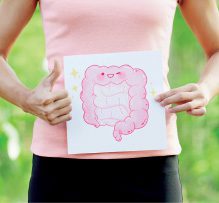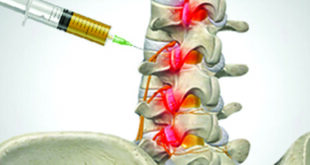By Linda A. Kiley, MD
 The more we learn about our bodies and physiology, the more we come to appreciate the importance of intestinal health in maintaining good health everywhere. The organisms that live in our intestines have a tremendous effect on our overall health, well-being, and state of mind. It is common for my patients who are experiencing problems with their bladders or having abdominal or pelvic pain to complain of either chronic constipation, diarrhea, bloating, or some combination. I have a separate handout on constipation that I give to my patients. Maintaining health in the gut involves more than just taking probiotics or supplements. It is critical to feed the healthy organisms and starve the harmful ones in order to achieve maximum wellbeing. Every individual has a different intestinal microbiome (my-kro-by-ohm) which will determine what types of foods are likely to be tolerated as well as a number of other important health parameters. We’ll go over how to make proper choices to feed the good colonizers and reduce numbers of the irritating, agitating colonizers.
The more we learn about our bodies and physiology, the more we come to appreciate the importance of intestinal health in maintaining good health everywhere. The organisms that live in our intestines have a tremendous effect on our overall health, well-being, and state of mind. It is common for my patients who are experiencing problems with their bladders or having abdominal or pelvic pain to complain of either chronic constipation, diarrhea, bloating, or some combination. I have a separate handout on constipation that I give to my patients. Maintaining health in the gut involves more than just taking probiotics or supplements. It is critical to feed the healthy organisms and starve the harmful ones in order to achieve maximum wellbeing. Every individual has a different intestinal microbiome (my-kro-by-ohm) which will determine what types of foods are likely to be tolerated as well as a number of other important health parameters. We’ll go over how to make proper choices to feed the good colonizers and reduce numbers of the irritating, agitating colonizers.
Step 1: Eliminate the toxic foods and liquids from your diet. Good eating and drinking habits are critical in maintaining happy intestinal flora. Sometimes food sensitivities can be present but may not be obvious. Having a stool test to reveal the gut microbiome and ideal foods for an individual may be helpful. We have lab companies we work with to send test kits out to your home for a reasonable cost that will test your blood for food sensitivity and/or stool for the organisms living in your gut and give you some idea of what might be best for you to emphasize or avoid.
Universally unhealthy: Artificial sweeteners, carbonated beverages, processed foods, “fast” foods, most store-bought juices (they are mostly sugar), most “sports” drinks, overly sweetened foods. Lose all of these from your diet! This includes many prepared teas and coffees and snack foods.
Variably unhealthy/best to limit: Dairy, factory farmed meats, fried foods, seafood (due to contaminants like mercury), high glycemic index/starchy “white” foods. Again, this may be individualized through food sensitivity testing.
Emphasize: Fresh, preferably locally grown (when possible) vegetables and fruits. Try to get one food of every color in your diet each day. Check out the “Clean 15 and Dirty Dozen” lists of foods. Clean water. If you must have something in your water to flavor it, try getting a bag of frozen mixed fruits/berries and lining the bottom of a pitcher with the frozen items, then fill the pitcher with fresh water and place in the refrigerator. That will give the water a bit of “flavor” without using a lot of artificial flavorings and contaminants. Plant based proteins and nutrients, particularly coming from fresh sources, provide your gut with the best possible environment and help the most healthy organisms to thrive. This list includes “prebiotics”, not to be mistaken for probiotics which are strains of a few bacteria used to repopulate the intestine with some select strains of bacteria. A normal intestine has hundreds or thousands of organisms and having diversity is healthy.
Step 2: Move your body. You need to exercise every day. This needn’t involve going to the gym for a major workout, a nice long walk may be enough. Pool exercise, walking, jogging, yoga or Pilates, functional fitness training, martial arts, tennis, or other sports are all options. If you are unable to engage in anything other than moving your arms and legs and torso, even if you are unable to walk, you may be able to move your body to help the blood circulate, get oxygen flowing to your cells, and release the toxins as well as the tension from everyday living. Some form of exercise is necessary every day for optimal health. Find yours and stay with it. Your gut will function much better if you are getting movement nutrition as well.
Step 3: Get some mental and physical rest. A meditation or mindfulness practice can be very helpful in eliminating spasm and promoting better body function. Adequate sleep is important for maintaining health including gut health. If you have difficulties with sleep, be certain there are no underlying disorders creating a bigger problem.
A sleep specialist can be helpful in this situation as well.
Step 4: Consider a gut peptide such as BPC157 (500mcg per day up to 1500mcg per day for severe cases) for a few months to help restore balance.
If you are doing all of these things perfectly, can go back to Step 1 and be assured you are doing everything right, and are still having problems, then additional evaluation is important. There are many conditions that can cause problems, including infections, medications, food sensitivities, toxins, autoimmune disorders, among others. The complex interplay between what we ingest and how we manifest symptoms can make it difficult to figure out, but starting with an elimination diet may also be helpful.
Food Sensitivities:
More people are developing food sensitivities, probably due to the environmental impact of organophosphates and other contaminants that are able to bind to molecules in different foods and create an immune response. Whatever the reason, food sensitivities are likely the cause of many chronic ailments, and data have shown that eliminating foods that create an undesirable immune response in an individual can result in a remarkable improvement in health and vitality. In my practice, I encourage patients having multiple chronic complaints which could include bloating, fatigue, skin rashes, muscle aches, recurrent infections, headaches, or sinus problems to explore testing for food and environmental sensitivities. A small change with an elimination diet tailored to the individual’s needs can make a huge difference in overall health and well-being. I have a nutrition and fitness counsellor in my office who is able to create a custom diet plan to include balanced meals eliminating foods or food groups that create an undesirable immune reaction in my patients. Very often, this is a critical step in re-establishing health and achieving goals such as better sleep, weight loss, improved energy, as well as clearer thinking and better immune function.
In summary, the gut is a primary force in our bodies for keeping us well and for allowing us to become ill. Food really is medicine, but like medicine, it must be appropriate to the individual. For more information contact Ultra Health & Wellness at 561-671-0041.
Ultra Health & Wellness
561-544-7245
3375 Burns Road, Suite 204
Palm Beach Gardens, FL 33410
 Central Florida Health and Wellness Magazine Health and Wellness Articles of the Villages
Central Florida Health and Wellness Magazine Health and Wellness Articles of the Villages



